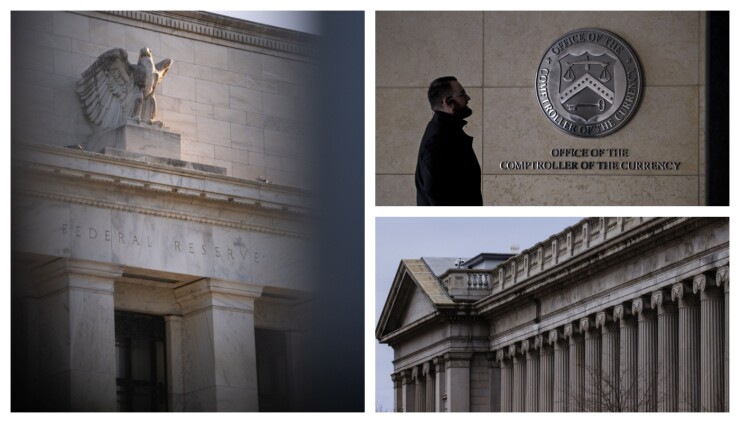Six global systemically important banks will participate in the Federal Reserve's pilot climate scenario analysis exercise next year.
The Fed said Thursday that it has tapped JPMorgan Case, Citigroup, Bank of America, Goldman Sachs, Morgan Stanley and Wells Fargo for the program, which will commence in early 2023 and likely run until the end of the year.
Like the

The Financial Services Forum, which represents many of the country's largest banks, welcomed the exercise and noted that many participating banks have been modeling climate risk already.
"Our members recognize the need for sound management of exposures to climate-related financial risks and have incorporated such risks into their risk-management frameworks for the past several years," the Forum said in a statement. "Our participating members look forward to working with the Federal Reserve on this pilot exercise."
Fed Vice Chair for Supervision Michael Barr first announced the Fed's plan to roll out a "microprudential scenario analysis exercise" focused on climate risk in
Barr said the Fed would work with the Federal Deposit Insurance Corp. and the Office of the Comptroller of the Currency to develop guidelines for large banks on managing climate risks as well as mechanisms for monitoring banks' readiness to deal with climate shocks. The limited scenario test is the first step in that process, he said.
Barr said the examination would explore both the physical risks of climate change — such as storm or flood damage to businesses and properties — as well as transition risk, meaning the impact of policy changes aimed at curbing things like carbon consumption. He noted that the Fed's ability to intervene on climate issues were limited to issues directly related to bank solvency.
"The Federal Reserve is working to understand how climate change may pose risks to individual banks and to the financial system," he said. "The Federal Reserve's mandate in this area is important, but narrow, focused on our supervisory responsibilities and our role in promoting a safe and stable financial system."
Still, the announcement of the pilot program raised alarm bells with some Fed watchers who worry about the central bank overstepping its statutory bounds on issue not directly related to the financial sector.
Sen. Pat Toomey, R-Pa., the ranking Republican on the Senate Banking Committee, said the pilot program could be laying the groundwork for climate related regulations.
"The Fed's new 'pilot' program is the first step toward pressuring banks into limiting loans to and investments in traditional energy companies and other disfavored carbon-emitting sectors," Tommey said in a statement. "There is no risk from global warming that banks aren't already fully capable of pricing into their decisions, and the Fed's intrusion into this process only underscores that the real risk is government."

Toomey has been hawkish about the Fed's policies regarding climate-related supervision. During the Senate Banking Committee's nomination hearing for former Fed Governor Sarah Bloom Raskin, the Biden administration's first pick to be vice chair for supervision, Toomey took issue with Raskin's previous endorsement of limiting COVID-19 relief to fossil fuel companies.
The senator also pressed Barr for his view on climate supervision, too, during his nominating hearing. Barr said he favored a "quite limited, quite narrow" approach to monitoring for such risks, but Toomey's concerns persist.
"The real purpose of this program is to ultimately produce new regulatory requirements," Toomey said Thursday. "While the Fed can call this pilot program by whatever name it may prefer, it sounds exactly like a stress test to me."
During the Brookings event, Barr noted that the central bank was not expecting any climate stress examination to be applicable to smaller banks anytime soon.
"We're quite a way from being able to offer even good advice to community banks on the issue of climate change," he said. "And so the work that we're focused on and will be focused on this coming year is really focused at the very largest institutions, a handful of the globally systemically important banks, to begin to wrap our arms around this and to think in a more systematic way about the risk that climate change could pose to the financial system or to individual banks."
The Fed will announce the details of the scenarios next year. Analysis will focus on the impact certain climate, economic and financial variables have on various parts of the banks' portfolios and business strategies. Results from individual banks in the program will not be made public, but the Fed has committed to publishing broad takeaways from the analysis about specific risks and best practices.





